Coronavirus: Driving Into a Greener Tomorrow

The automotive industry worldwide is passing through technological disruptions and many of these are influenced by the urgent need for sustainable technologies and solutions. Concern over climate change, pollution and the efficient use of resources are driving this transition and changing the way the sector operates. India is not isolated and recently we saw a major milestone of BS6 rollout been achieved. This shift was achieved in a short duration and involved huge investments from oil and the auto industries. It will significantly bring down PM 2.5 emissions levels thereby reducing vehicular pollution in our cities. This year is also witnessing the severe impact of COVID-19 on global economy and industries worldwide. We are not insulated, and the pandemic has created reverberations with the auto industry in India which reported zero sales in April. Questions on economic sustainability arose as the growth projections and ratings took a nosedive though most experts agree that the Indian economy will bounce back. COVID-19 has also magnified the issue of environmental sustainability and the contribution of Original Equipment Manufacturers (OEMs) to the environment and climate change. After all, the manufacturers carry the responsibility to address vital environmental issues that the planet is facing today.
Also Read: Exclusive: Toyota Will Bring The Land Cruiser Brand Back To India

The Toyota Eco Zone is an ecological park within the Bidadi plant premises in Karnataka
COVID and Consciousness
Perhaps forgotten and relegated to the abyss of human considerations, nature has chosen to remind humankind of its duty. Today, there is a heightened sense of responsibility towards nature amongst the majority of citizens. For their part, the auto OEMs need to continue and augment sustainability measures across the supply chain and products to bring about a significant change to the environment and local communities. The auto industry contributes a significant 7.5 per cent to the Gross Domestic Product (GDP) and a whopping 49 per cent of the manufacturing sector with a large economic multiplier effect. Thus, there is a huge responsibility on the auto industry towards their customers, local communities and the country at large.

Toyota's 93.35 per cent of the total energy consumption was met by renewable energy sources in FY2019-20
The responsibility assumes significance in light of the greater emphasis on personal transportation in the post-COVID world. The market indicators point towards a preference to own vehicles due to concerns over social distancing and emerging difficulties in intra and inter-state travel faced by people across the country. Given the introduction of BS6 technology, India should roll out a scrappage policy to take the older more polluting vehicles off the roads. In this regard, we must also look at bringing in the end-of-life vehicle regime as a car is essentially an assembly of more than 800 parts and its disposal can be harmful to the environment if done unscientifically.

Automakers have a responsibility to drive sustainability and will thrive as the environment becomes more challenging
Above all, the pandemic offers an opportunity to automakers to embark on a path of impactful sustainability programs that address critical global environmental challenges. They can use this time to mull how they can better invest in sustainability initiatives that can achieve mutually beneficial and interdependent environmental and business goals. When the pandemic is behind us, those manufacturers that have a strong commitment to sustainability will thrive, win the confidence and admiration of the customers, and spur their buying choices.

Toyota sold over 15 million electric and hybrid cars globally till March 2020, saving 125 million tons of CO2 emissions and 47 million kilolitres of fuel
Business and Purpose
At Toyota, we show consideration to the planet in everything that we do. We investigate and promote systems and solutions that are eco-friendly. Toyota globally has developed its long-term environmental vision for positive impact on the environment, 'Toyota Environment Challenge 2050', which sets six environment challenges to be achieved, these are aligned with sustainable development goals. Today, Toyota is the largest xEV manufacturer with more than 15 million units (including SHEVs, PHEVs, BEVs & FCEVs) sold globally till March 2020, resulting in 125 million tons of CO2 emission reduction and 47 million kiloliters of savings in gasoline.

The Bidadi plant met 92.4 per cent of its manufacturing water demand through rainwater and recycled water last fiscal
At Toyota Kirloskar Motor (TKM) for the FY19-20 about 93.35 per cent of the total energy consumption was met from renewable energy and the plant met 92.4 per cent of its manufacturing water demand through rainwater and recycled water. TKM is a "Zero Liquid Discharge (ZLD)" plant. 100% wastewater generated is treated & used for manufacturing processes, gardening and afforestation activities.
To conclude, the post-COVID world would be different in many ways but the challenges to the environment and climate would be the same. The auto OEMs should take the lead in the manufacturing sector to create a greener planet and continue to pursue long-term sustainability goals even during a pandemic. There cannot be roadblocks on the path to a sustainable world.
Latest News
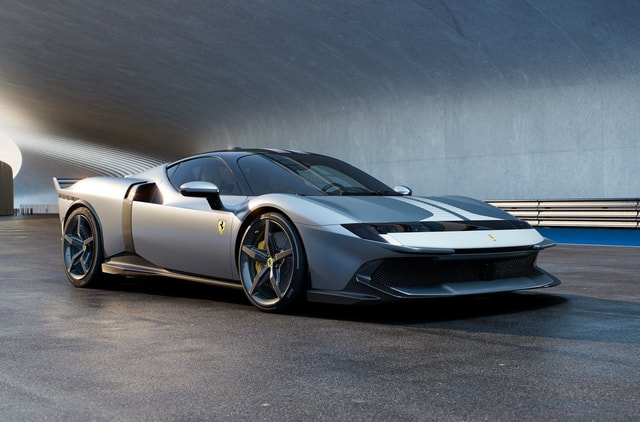 car&bike Team | Feb 16, 2026Ferrari 849 Testarossa India Launch On March 14The Ferrari 849 Testarossa is a replacement of the SF90 Stradale, and this prancing horse will be launched in India on March 12, 2026.2 mins read
car&bike Team | Feb 16, 2026Ferrari 849 Testarossa India Launch On March 14The Ferrari 849 Testarossa is a replacement of the SF90 Stradale, and this prancing horse will be launched in India on March 12, 2026.2 mins read Jaiveer Mehra | Feb 16, 2026Nissan Gravite India Debut Tomorrow: What To ExpectThe Gravite is Nissan’s entry into the subcompact MPV segment and shares its underpinnings with the Renault Triber.1 min read
Jaiveer Mehra | Feb 16, 2026Nissan Gravite India Debut Tomorrow: What To ExpectThe Gravite is Nissan’s entry into the subcompact MPV segment and shares its underpinnings with the Renault Triber.1 min read Jaiveer Mehra | Feb 16, 2026Mobileye To Deploy Hands-Off ADAS Tech In India In 2027The company is also eyeing localising its ADAS systems in India as it expects demand to rise with changes in regulations.1 min read
Jaiveer Mehra | Feb 16, 2026Mobileye To Deploy Hands-Off ADAS Tech In India In 2027The company is also eyeing localising its ADAS systems in India as it expects demand to rise with changes in regulations.1 min read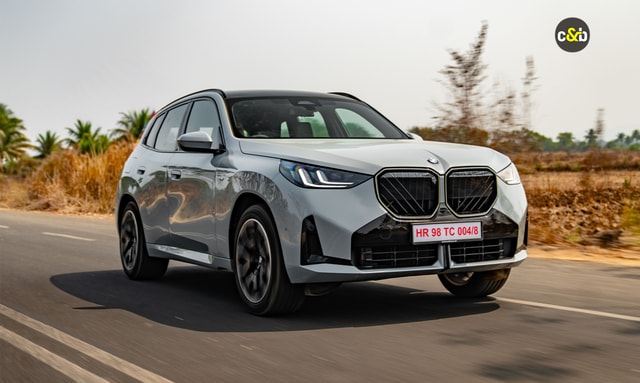 Bilal Firfiray | Feb 16, 2026BMW X3 xDrive30 M Sport Pro Lanched In India At Rs 74.50 LakhThe new range-topping xDrive 30 done up in the M Sport Pro trim offers 255bhp and 400Nm. Can do 0-100kmph in just 6.3 seconds1 min read
Bilal Firfiray | Feb 16, 2026BMW X3 xDrive30 M Sport Pro Lanched In India At Rs 74.50 LakhThe new range-topping xDrive 30 done up in the M Sport Pro trim offers 255bhp and 400Nm. Can do 0-100kmph in just 6.3 seconds1 min read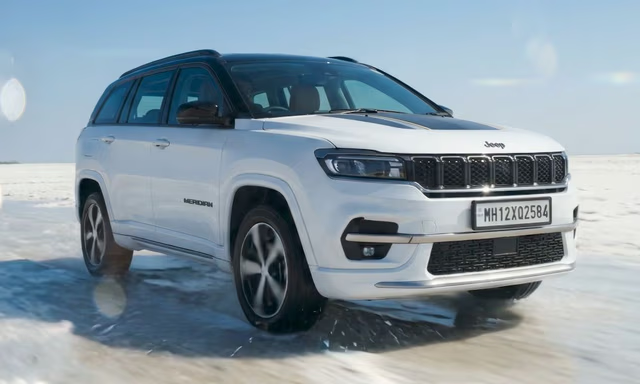 Jaiveer Mehra | Feb 16, 2026Jeep Meridian Track Edition Launched In India; Prices Start At Rs 35.95 LakhSpecial edition of the Meridian is based on the fully-loaded Meridian Overland.1 min read
Jaiveer Mehra | Feb 16, 2026Jeep Meridian Track Edition Launched In India; Prices Start At Rs 35.95 LakhSpecial edition of the Meridian is based on the fully-loaded Meridian Overland.1 min read Girish Karkera | Feb 16, 2026MG's First Plug-In Hybrid For India Coming In 2026, Confirms MD Anurag MehrotraJSW MG is pivoting toward a hybrid and electric future, targeting a 30% market share for New Energy Vehicles (NEVs) by the end of the decade1 min read
Girish Karkera | Feb 16, 2026MG's First Plug-In Hybrid For India Coming In 2026, Confirms MD Anurag MehrotraJSW MG is pivoting toward a hybrid and electric future, targeting a 30% market share for New Energy Vehicles (NEVs) by the end of the decade1 min read
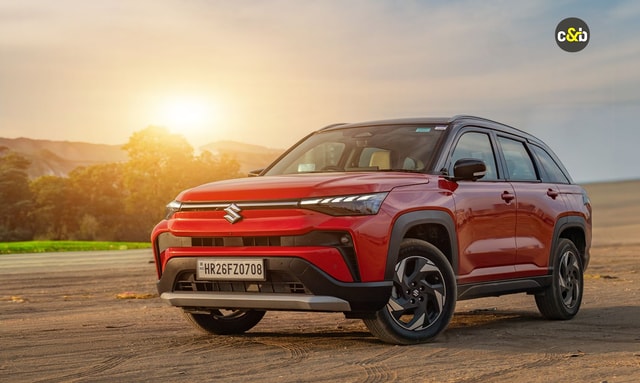 Jafar Rizvi | Feb 15, 2026Maruti Suzuki Victoris: Long-Term Review - Report 1The Victoris is Maruti’s latest offering for the Indian market, and after spending some time with it, here are a few early impressions.1 min read
Jafar Rizvi | Feb 15, 2026Maruti Suzuki Victoris: Long-Term Review - Report 1The Victoris is Maruti’s latest offering for the Indian market, and after spending some time with it, here are a few early impressions.1 min read Bilal Firfiray | Feb 12, 2026BMW X3 30 xDrive M Sport Review: The Driver’s SUV ReturnsRange-toppingX3 30 xDrive M Sport brings back the fun with 255bhp and genuine enthusiast appeal. Does this performance-focused SUV stand out?5 mins read
Bilal Firfiray | Feb 12, 2026BMW X3 30 xDrive M Sport Review: The Driver’s SUV ReturnsRange-toppingX3 30 xDrive M Sport brings back the fun with 255bhp and genuine enthusiast appeal. Does this performance-focused SUV stand out?5 mins read Bilal Firfiray | Feb 11, 2026Mercedes-AMG CLE 53 Coupe Review: The Goldilocks AMG?The Mercedes-AMG CLE 53 Coupe is a concoction of hooliganistic performance and everyday usability. Here’s why this Rs 1.5 crore two-door AMG might be the perfect modern sports coupe for India.6 mins read
Bilal Firfiray | Feb 11, 2026Mercedes-AMG CLE 53 Coupe Review: The Goldilocks AMG?The Mercedes-AMG CLE 53 Coupe is a concoction of hooliganistic performance and everyday usability. Here’s why this Rs 1.5 crore two-door AMG might be the perfect modern sports coupe for India.6 mins read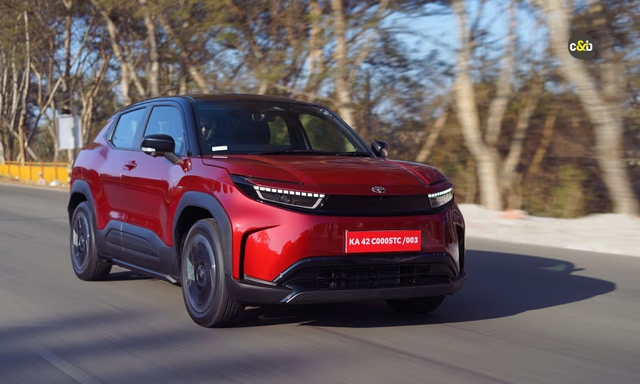 Girish Karkera | Feb 11, 2026Toyota Ebella EV Review: Compact And Fun-To-Drive With The Promise Of Stress-Free AftersalesNo hiding the fact that it is a clone of the Maruti Suzuki eVitara, but the first all-electric Toyota in India is reasonably well-rounded8 mins read
Girish Karkera | Feb 11, 2026Toyota Ebella EV Review: Compact And Fun-To-Drive With The Promise Of Stress-Free AftersalesNo hiding the fact that it is a clone of the Maruti Suzuki eVitara, but the first all-electric Toyota in India is reasonably well-rounded8 mins read Bilal Firfiray | Feb 10, 2026Tata Punch EV Long Term Review: Small EV With A Big-Hearted PersonalityWith the new Punch EV Facelift just around the corner, we decided to take a look at what it excels at and what could be improved.7 mins read
Bilal Firfiray | Feb 10, 2026Tata Punch EV Long Term Review: Small EV With A Big-Hearted PersonalityWith the new Punch EV Facelift just around the corner, we decided to take a look at what it excels at and what could be improved.7 mins read




























































































































